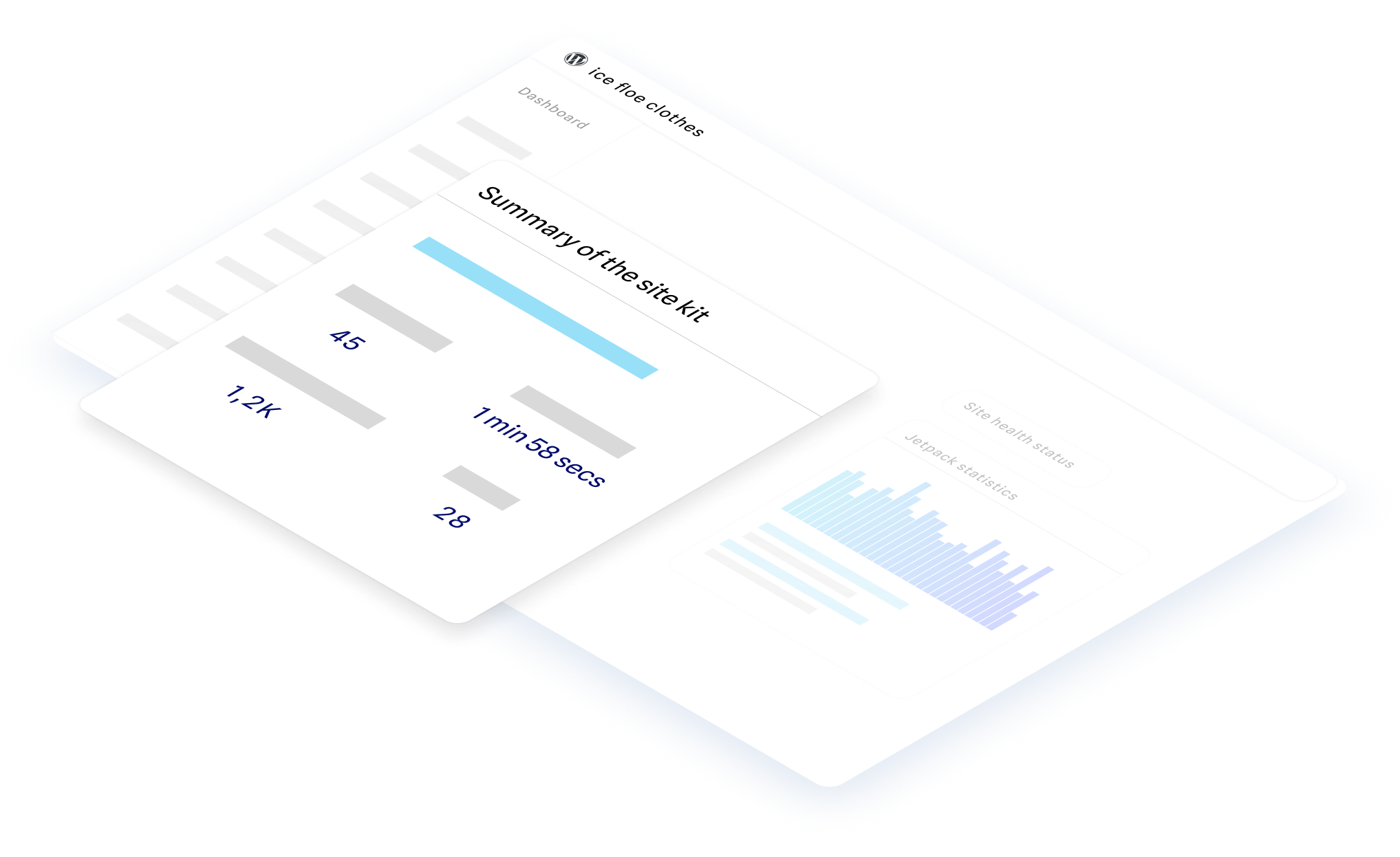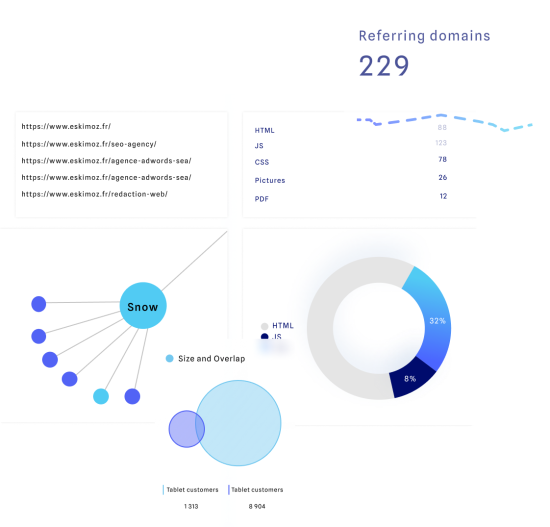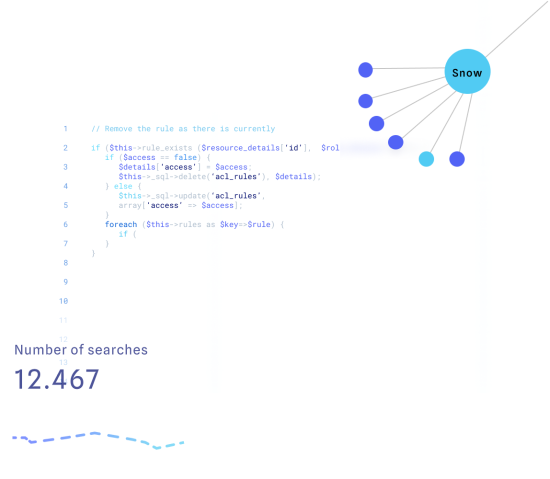
Website Creation: We create customised websites for you
Do you have a website creation project? Eskimoz, your expert SEO agency, will create a website tailored to your needs, using a CMS or custom-built from scratch.

Website Creating a website: Why is it necessary?
Eskimoz takes care of your website creation project and offers bespoke solutions to meet your exact requirements. Discover everything you need to know about website creation!
A key marketing tool
Without a website, your online presence is non-existent. Prospective customers can’t find you, contact you, or get to know your business. The internet has become an indispensable tool used daily for communication, shopping, work, entertainment, and, of course, information gathering. When consumers want to learn more about a company, brand, product, or service, their first instinct is to search the web, most likely starting with Google.
In essence, regardless of your industry or company size, you can’t afford to be without an online presence. A website serves as both a virtual storefront and a vital component of your digital marketing strategy. It’s crucial to create a website tailored to your professional needs, incorporating essential features to support your operations and achieve your objectives.
However, website creation is complex. How do you get started? What are the key considerations? Creating a website involves constructing its architecture, defining its visual identity, ensuring a smooth online presence, and addressing security concerns. Choosing the right partner to develop your website and meet all your requirements is paramount. Eskimoz provides comprehensive answers to all these questions!

How is a website created?
Creating your own website
There are multiple options for creating a website, but the most accessible ones involve using Content Management Systems (CMS). These tools allow you to build web pages and add content without the need for programming knowledge or understanding HTML language.
The most popular CMS platforms are WordPress, Drupal, Joomla, and Prestashop, each with its own specialisations. WordPress is versatile and works particularly well for blogs, Prestashop is dedicated to e-commerce website creation, Drupal is suited for complex portals with advanced architectures, and so on.
These tools follow a similar construction approach: you choose the type of website you want, select a visual theme (which determines the layout, overall appearance, and graphic design), and include relevant content such as images and text. Additionally, you can enhance your website with various functionalities through extensions (plugins), allowing you to integrate features like forms or an online store.
Creating a website using these tools has several advantages. They’re user-friendly, accessible to everyone, often free, and quick to set up. However, there are also limitations to consider. These tools may have restrictions in terms of functionalities and technical performance, and they may not offer the level of customisation required for a truly unique website. Making significant changes can be technically challenging and costly as well.

Opting for a free website creation platform will quickly reveal its limitations. Modifying most components of your site, customising its visual identity, or leveraging it as an effective digital marketing tool can be difficult, if not impossible. This is particularly true when it comes to building complex e-commerce websites.
Creating your own website from scratch, without using a CMS (which would be the preferred method), requires a mastery of programming skills, which not everyone possesses!
Hiring a web agency
When you decide to enlist the services of a web agency for website creation, they have two options. They can either use a CMS to design the structure and develop specific modules tailored to your specific requirements, or they can build the site from scratch, ensuring a fully customised solution. The latter becomes essential when implementing complex functionalities, facilitating user interaction, integrating a highly secure private area (such as a client portal), safeguarding personal data, offering multilingual support, and more.
Creating a bespoke website involves the expertise of developers who employ a framework—a dedicated web development environment that provides a blank canvas for crafting a site from the ground up, incorporating desired features. This approach leverages their skills and experience, resulting in a high-quality website, particularly if the agency you choose has previously developed platforms similar to your needs.

Certain agencies specialise in specific domains, adding further value. For instance, when Eskimoz takes charge of your site creation, you not only benefit from their web development experience but also their in-depth expertise in SEO.
Another advantage extends beyond the website creation project itself—a long-term relationship forms between you and the web agency. This means you can rely on their support in case of issues, when adding new modules or functionalities, or for ongoing maintenance and updates to your site.
Website creation: what are the key steps?
What does a website creation project entail? Objectives, specifications, structure, functionalities, visual identity, domain name, web hosting—find out here!
Defining your website creation objectives
Every website creation project must consider the objectives that are specific to your business and activity.
A website can serve as a virtual storefront, showcasing your flagship products online, but it can also be a powerful tool for acquisition and conversion, enhancing brand visibility, fostering community engagement, providing user information, or even functioning as a complete e-commerce store. This is why it’s important to turn to a web agency for a bespoke website creation when free templates no longer meet your needs.
At the start of your project, you need to define the goals you want to achieve with your website: presenting your company or brand, driving online sales, promoting your products or services, and more. This will help shape the design of your pages once the website creation process begins.


Writing a project brief
-
List of functionalities
-
Visual identity
-
Number of pages
-
Technical constraints
-
Budget constraints
-
Web hosting
Designing the structure and content of the website
The overall structure of your website should be determined early on in your website creation project. During this stage, you need to decide on the number and types of pages required to make your website fully functional. Typically, these would include:
-
A homepage
-
Pages dedicated to your services or products (product listings)
-
Landing pages for conversion purposes
-
An “about” page
-
A contact page
-
A legal information page
-
A blog for publishing articles
Furthermore, your website creation may involve additional pages such as a client area, shopping cart with secure payment options (essential for e-commerce websites), training pages, FAQs, forums, calendars, reservation solutions, and forms.
Each page should have its own relevant content, including text, images, illustrations, videos, and more. While the actual content doesn’t need to be created at this stage, it’s beneficial to plan and envision the final appearance of each page.
Planning functionalities
When visitors arrive on your website, whether from search engines or social media platforms, they should be able to engage in various actions, such as reading content, watching videos, contacting your sales team, making purchases, filling out forms, creating user profiles, downloading documents, and more.
To ensure that these actions can be performed smoothly once the website is live, it’s essential to plan and incorporate the necessary functionalities during the early stages of your website creation project. These functionalities should be defined in advance and included in your project brief, especially if they require specific development work beyond the capabilities of existing modules. They’ll play a vital role in shaping the development process of your website and determining the associated costs.
Defining the website’s visual identity
The visual identity of a website is crucial in shaping users’ perception and setting it apart from competitors. It should hold a significant place in your website creation project.
Specifically, your visual choices should align with your company or brand’s formal identity. This involves referring to your brand guidelines during the website creation process, including aspects such as layout, typography, colours, logo, and other aesthetic elements that reflect your company.
To provide clear guidance to your web agency, it’s helpful to share examples of visually appealing websites that resonate with you. However, keep in mind that the website creation process can be time-consuming, and finalising the design may take some time. It’s important to ensure that the chosen visual identity truly represents your brand. Typically, a developer will start with one of the main pages, often the homepage, and seek your approval before replicating the design for the remaining pages of the site.

Choosing the domain name
The “domain name” refers to the URL that will be used to access your website. In our case, it’s “eskimoz.fr,” as you can see in your browser’s address bar.
The domain name serves as your site’s identity and the pathway to reach it, making its selection crucial in your website creation process. It should be aligned with your company or brand name, or relevant to your business activity. For instance, a software publisher having a domain name like “easy-recipes.fr” wouldn’t be appropriate.
You can acquire a domain name from specialised websites or web hosting platforms. It’s important to check its availability first and then pay a certain amount (usually between £5 and £15) to secure it for a year. If you have entrusted your website creation to a web agency, you don’t need to worry about this step. Simply communicate your preferences and provide multiple options in case some choices are already taken.

You will also need to choose a domain name extension, which comes after the dot (“.”) in the URL. This extension can be generic (such as .com or .org), providing reassurance to users. It can also be geographically specific, like .fr for France, .es for Spain, or .de for Germany. Alternatively, it can be tailored to your business activity, such as .shop for an e-commerce site. (Note that institutional websites have their own extensions, like .gouv.fr, which are not accessible to private organisations.)
Choosing the web hosting method
Web hosting refers to the location where your website will be stored, similar to a digital commercial space or office. It involves using a server to store all the data related to your site. Usually, third-party companies (like OVH and Hostinger) manage these servers, and you rent storage space at a cost that varies depending on your data volume. If you have entrusted your website creation to a web agency, they will take care of hosting your platform on a server.
Putting your website online
The website launch marks the final stage of your website creation project. It’s a critical step that involves uploading your site’s data to the chosen server and redirecting the domain name to ensure users can access it by entering your URL in their browser.
This process encompasses various actions depending on the type of website and development approach. For instance, content management systems like WordPress rely on databases to store dynamic elements such as blog articles, necessitating the connection between the database and site files.

If your project involves revamping an existing site to meet your new requirements, the website launch process differs slightly. You’ll begin with a pre-production environment and migrate the fully developed site to the already in-use server.
These aspects may be unfamiliar to you, highlighting the value of engaging a specialised agency for your website creation.
After creating your website
Congratulations! Your website is now online and fully functional. However, your website creation project doesn’t end here. After the launch, there are a few important considerations:
-
SEO
SEO encompasses various strategies that enhance your website’s visibility in search engine rankings. These strategies involve technical aspects, content optimisation, and linkbuilding. To ensure an SEO-friendly site, it’s advisable to incorporate specific technical features in the project requirements. After the website is launched, you can then focus on activation the remaining SEO strategies.
-
Updating your website
A website is a dynamic entity, and it’s crucial to keep the tools and software used up to date, especially for security reasons. Additionally, it’s important to regularly update your static pages. It’s also worth noting that search engines tend to prioritise fresh content when it comes to organic ranking.
-
Ensuring Security
Security is an integral part of any web project, particularly during the creation of a website. Each year, eight out of ten companies fall victim to cyber attacks (source), not to mention the number of data breaches by hackers. There are multiple ways to enhance the security of your site, including implementing the HTTPS protocol (via SSL certificate integration), establishing a secure payment module (for e-commerce sites), regularly backing up data (to facilitate recovery in case of a disaster), and more.
-
Measuring performance
How can you determine if your website is helping you achieve your objectives? By consistently measuring its performance through various means, such as registering with the Google Search Console to receive recommendations and conducting analyses of traffic and backlinks.
-
Integration with social media
Given the significant role of social media platforms, it’s essential to incorporate links between your web pages and your accounts on platforms like Facebook, LinkedIn, Twitter, and others.
Your Website Creation:
Eskimoz’s Added Value
Eskimoz is a reputable web agency that takes full responsibility for your website creation project, ensuring it aligns with your specific needs, goals, constraints, and budgetary requirements. With Eskimoz, you’ll receive a website that precisely meets your expectations, whether it’s built on a popular CMS like WordPress or custom-developed based on your detailed specifications provided in a comprehensive requirements document.
-
A listening phase to precisely identify your needs
-
A thorough analysis of the existing site (in the case of a redesign)
-
Bespoke website creation that meets your requirements
-
SEO guidance for optimal performance
-
Comprehensive support that goes beyond a standard service
-
High-end website creation service
-
Support available at your disposal
Our Commitment
-
Expertise
Since 2010, we have worked with over 2000 clients across 90 countries.
-
Passion
We are a team of passionate, industry-focused individuals who are committed to your success.
-
Performance
We’re committed to implementing a data-driven strategy, making a real impact on your bottom line by providing avenues for growth.












